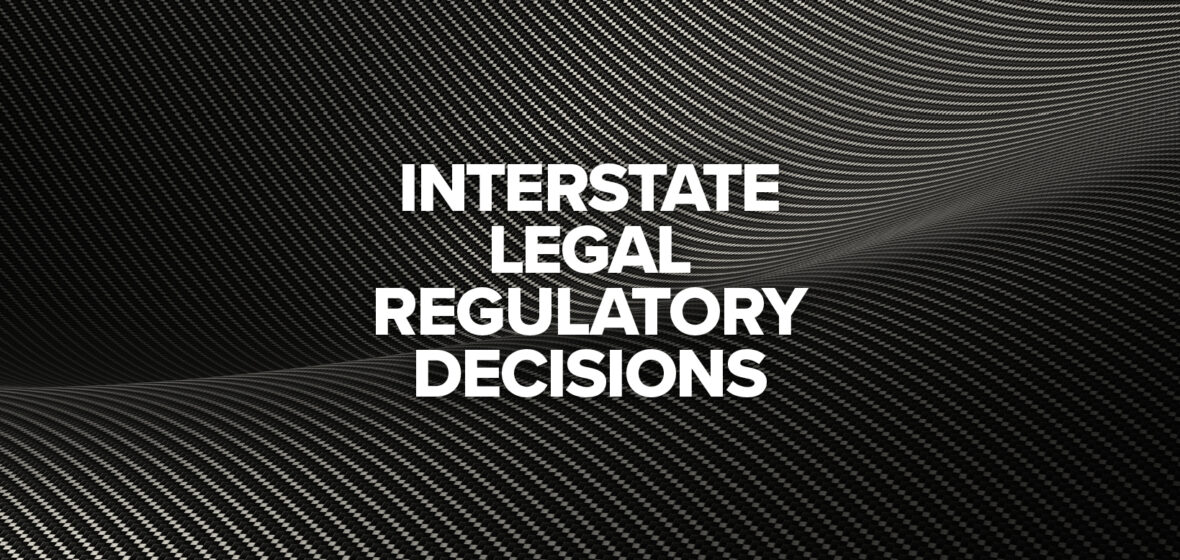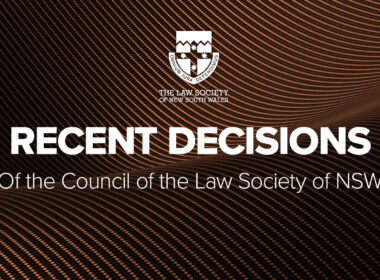The following are summaries of interstate legal regulatory decisions
VICTORIAN LEGAL SERVICES BOARD v BOWERS-TAYLOR (NO 3) [2023] VSC 771
On 19 December 2023, the Supreme Court of Victoria published reasons for its decision to find Mr Jonathan Bowers-Taylor guilty of contempt.
By way of background, on 17 July 2023, the Victorian Legal Services Board (Board) appointed Damian Neylon as manager of JBT Lawyers. The appointment was made after Mr Bowers-Taylor, who was the principal of the incorporated law practice known as JBT Lawyers, failed to apply to renew his practising certificate for the year commencing 1 July 2023. After Mr Neylon encountered difficulty obtaining access to the JBT Lawyers’ records, the Board commenced proceedings on 1 August 2023 in the Supreme Court of Victoria seeking various orders under s 447 of the Legal Profession Uniform Law (Vic).
Subsequently, by summons dated 21 August 2023, the Board applied for orders that Mr Bowers-Taylor be punished for contempt for breaching orders made by the Supreme Court of Victoria on 9 August 2023.
The Supreme Court of Victoria’s reasons for decision provide that Mr Bowers-Taylor is guilty of contempt for:
- failing, as required by the 9 August 2023 orders:
- to disclose to Mr Neylon that JBT Lawyers was on the record as the legal representative for the appellant in the matter of Ming He Wang v Commissioner of State Revenue, proceeding number S ECI 2023 00488 (Supreme Court Proceeding);
- to provide Mr Neylon with all physical and electronic records and communications relating to the Supreme Court Proceeding; and
- in breach of by the 9 August 2023 orders, continued to conduct the Supreme Court Proceeding on behalf of JBT Lawyers without Mr Neylon’s knowledge and/or permission, including by:
- communicating with the client, the other party and the Court regarding timetabling orders and the filing of documents;
- signing Minutes of Consent orders on behalf of the client and providing them to the Court and the other party; and
- preparing an affidavit on behalf of the client and filing and serving it in the proceedings.
Read the full decision here.
MAECEVSKI V VICTORIAN LEGAL SERVICES BOARD (REVIEW AND REGULATION) [2023] VCAT 1324
On 16 October 2023, a delegate of the Victorian Legal Services Board (VSLB) resolved to cancel Mr Nick Marcevski’s practising certificate and to prohibit him from applying for any practising certificate until 22 September 2028.
On 30 November 2023, the Victorian Civil and Administrative Tribunal (VCAT) published a decision in which it dismissed an application by Mr Marcevski for a stay of those resolutions, pending a review of the resolutions. The Tribunal held (at [59] and [60]):
“In this case, the community or public interest points strongly against the grant of a stay. As the failure to grant a stay will not render Mr Marcevski’s application for review nugatory (for the reasons explained), there is no factor that points strongly in favour of a stay.
In my view, this is a case where, on balance, the community or public interest outweighs other considerations (i.e. that there is a serious question to be tried, the failure to grant a stay will cause some financial prejudice to Mr Marcevski and there is likely to be a lengthy period of time to the hearing), even where the other considerations are considered collectively.”
Read the full decision here.
VICTORIAN LEGAL SERVICES COMMISSIONER V GUSS (LEGAL PRACTICE) [2023] VCAT 1325 (29 November 2023)
On 7 April 2022, the Victorina Legal Services Commissioner (VLSC) commenced proceedings in the Victorian Civil and Administrative Tribunal (Tribunal) against Mr Joseph Guss.
Mr Guss applied for the proceedings to be permanently stayed, summarily dismissed, or struck out on the following bases:
- There has been delay associated with the bringing of the charges which justifies them being permanently stayed or summarily dismissed process (the delay argument).
- Each charge relates to a different matter and so should be dealt with separately. Not to do so would be oppressive, would not permit a fair trial, and would constitute an abuse of process (the joinder argument).
Mr Guss also contended that the principles and procedures which apply in criminal proceedings have application to the disciplinary proceedings brought against him, and that the proper application of these in this instance should lead to the charges not proceeding.
On 30 October 2023, the Tribunal dismissed Mr Guss’ application.
In relation to the delay argument the Tribunal held (at [73] – [83]):
“Both parties’ submissions assumed that in considering the exercise of discretion under s 75 of the VCAT Act in this case, on the basis of an abuse of process comprised by delay, the Tribunal should apply similar considerations to those described above, which are applied by the courts when considering whether a permanent stay should be ordered. I agree.
That is, I need to conduct a weighing process, balancing the relevant factors, in particular, fairness to Mr Guss, and the importance of conducting disciplinary proceedings as part of protecting the public, by upholding professional and ethical standards.
The impact on Mr Guss of the delay is for the most part described by him only in terms of generalised assertion: it took five, four and seven years after each respective complaint or notification, for the matter to be brought to VCAT, and it follows from this that the bringing of the charges is an abuse of process.
This became slightly more specific when Mr Guss contended that he is prejudiced in the conduct of his defence by the non-availability of Ms Nevitt and Ms Brown. And, in his oral Reply submissions, that he has lost the ability to cross-examine Ms Nevitt on whether the funds he received were trust monies or not.
In my view, these simple assertions fall well short of providing the high level of satisfaction I would need to have to order that the proceeding be summarily dismissed at this point. While the delays which have occurred in bringing the charges are undesirable, they are not of the magnitude of those which often occur in historical sexual abuse cases, such as XG, to which he refers. And they are in part contributed to by Mr Guss himself. They hardly satisfy the ‘very heavy burden’ Mr Guss bears, in seeking to demonstrate that the bringing of these charges in April 2022 amounted to an abuse of process, adverse to him.
…
I refuse Mr Guss’ application for summarily dismissal on the ground of delay.”
In relation to the joinder argument, the Tribunal held (at [84] – [89]):
“As stated by Bongiorno J in XD no 2, the rules of joinder and severance of criminal charges do not apply to disciplinary cases.
I accept that as part of the Tribunal’s obligation to accord fairness, the general principles as described in Walton and in XD no 2 apply in disciplinary proceedings. But they do not require severance of the charges brought here.
Nor has Mr Guss provided any reasons why severance is required. He has simply asserted that it is. He has simply assumed that because there are eight charges, or three sets of charges, which cover various conduct during the course of the three client matters (and subsequent investigations), that they must be heard separately from each other.
This is not a jury trial of criminal charges. It is a professional disciplinary proceeding. Parliament has determined to confer on Tribunal members the duty and the power to conduct disciplinary proceedings in accordance with the Tribunal’s powers and procedures as set out in the VCAT Act. For disciplinary proceedings against legal practitioners, the Tribunal is invariably constituted by an experienced legal practitioner member of the Legal Practice List.
The Tribunal is required to act fairly and in accordance with the substantial merits of the case (s 97 of the VCAT Act). It is bound by the rules of natural justice (s 98 of the VCAT Act). The rules of evidence do not apply, although in certain instances (including in relation to disciplinary proceedings, which impact on the livelihood of regulated professionals) they can operate as a guide. The Tribunal is required to conduct each proceeding with as little formality and technicality, and to determine each proceeding with as much speed, as the requirements of the VCAT Act (which include according natural justice), the enabling enactment (the Uniform Law) and proper consideration of the matters before it permits.
It is part of the duty of Tribunal members to consider carefully the evidence relevant to each charge brought, its veracity and its weight. And not to take into account any information relating to other charges which might have an unfairly prejudicial impact. That occurs routinely in the Tribunal.
I do not accept that there needs to be separation of the three sets of charges, and certainly not of all eight.
Mr Guss’ application for summary dismissal or strike-out on the basis of the charges being brought together is refused.”
Read the full decision here.




